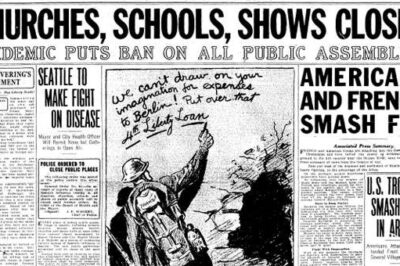The coronavirus crisis has traumatized us all. We now live in a weird world of medical masks, ventilators, drive-through-only restaurants, social distancing and online church services. We’ve canceled schools, closed businesses and courthouses, shut down theaters, postponed concerts, axed all sporting events and even shuttered Disney World. It feels like we’re trapped in a bad dream.
As we shelter in place, listening to media reports of a rising death toll, some people are wondering if the world is about to end.
I have some good news. In short, no—I can assure you the world isn’t ending. This virus will run its course, and the world will eventually go back to work. There is life after COVID-19.
How can I say that with such assurance? Because I read history, and I know we’re not the only generation to endure a pandemic. The world has survived dozens of plagues including the Black Death (which killed an estimated 60 million), the smallpox outbreak of 1520, the yellow fever outbreak of the late 1800s, the “Third Plague” of 1855 and the notorious Spanish flu pandemic of 1918-1919.
The Spanish flu killed between 40 to 50 million people globally, or about 4% of the world’s population at that time. The fatalities included an estimated 675,000 Americans. Here are a few facts about that plague, in case you were asleep when it was discussed in history class:
—Americans didn’t know how to fight the plague, and we didn’t have access to the medicines we have today. But there were public health warnings, quarantines, social distancing and lots of masks. People were especially advised not to spit in public. In New York City, Boy Scouts patrolled the streets, politely handing spitters printed cards that read: “You are in violation of the Sanitary Code.”
—Pennsylvania, Colorado and Maryland had the highest death rates. Health care workers set up makeshift tent hospitals in fields. Philadelphia was hit particularly hard by the Spanish flu. Bodies lay in the streets and in morgues for days there. Newspaper ads urged people to wash their hands.
—People had superstitious ideas about how to fight the virus. Some people believed wearing onions around their necks would ward it off. There was also a rumor that drinking whiskey could protect you from it! Children sang a popular skip-rope rhyme in those days. It went like this: “I had a little bird/ Its name was Enza/ I opened the window/ And in-flu-Enza.”
—Local health officials urged people to stay away from crowds. Schools, public meetings and church services were canceled for weeks. However, people didn’t know as much about hygiene in those days, so transmission rates were far worse than what we are experiencing today.
I’ve been fascinated by the way churches responded to the Spanish flu. Christian leaders, including Pentecostals, obeyed local health officials and closed their churches to prevent contagion. A.J. Tomlinson, leader of the Church of God denomination, wrote this in his diary on Nov. 13, 1918: “The government closed all churches and public gatherings of every kind. We missed four Sundays, but commenced again last Sunday. … During the last few weeks, many people have died of influenza. It is remarkable, however, how few of our people have died with it.”
G. F. Taylor, an early leader of the Pentecostal Holiness denomination, wrote in his diary on Oct. 31, 1918: “The Influenza seems to have set everything out of joint all over the country. There never was such great distress prevailing over the United Stated as there has been for the last month. Many requests have poured into [our] office for prayer. We have been trying to take them all to God.”
Historian Daniel D. Isgrigg noted in a recent article that the Spanish flu ravaged the city of Springfield, Missouri, where the Assemblies of God has its international offices. Although AG leaders viewed the disease as direct resistance to God’s work, they closed churches and revival services, and obeyed health department mandates.
AG leaders wrote: “All churches, missions, etc., including the Assembly of God, are closed because of the scourge of Spanish Influenza that is raging in the town. … We are finding it a splendid opportunity to devote additional time to prayer for our missionaries, and for the soldier boys [who were fighting in World War I], and for rain all over the world in this time of the Latter Rain. Where assemblies are closed, let the saints devote the time they would spend at meeting to the Word and to prayer.”
In the pages of the AG’s Pentecostal Evangel, there were reports of healings and miraculous protection from the virus, as well as somber accounts of how the Spanish flu ravaged foreign nations and killed AG missionaries.
What can we learn from a plague that occurred 102 years ago? Our spiritual ancestors didn’t let the Spanish flu stop them. They shut their church services down briefly to stop the spread of the virus, but they continued praying for the sick. They kept shining the light of the gospel in a dark season. And they used their extra time in quarantine to pray and draw closer to God.
They didn’t view the virus as a sign of the end of the world, or as an excuse to give up. They knew they had a world to reach for Christ. They stopped their work briefly until the angel of death passed over. Then they went back into the harvest fields with renewed faith. I pray we will do the same. {eoa}
J. Lee Grady is an author, award-winning journalist and ordained minister. He served as a news writer and magazine editor for many years before launching into full-time ministry.
Lee is the author of six books, including 10 Lies the Church Tells Women, 10 Lies Men Believe and Fearless Daughters of the Bible. His years at Charisma magazine also gave him a unique perspective of the Spirit-filled church and led him to write The Holy Spirit Is Not for Sale and Set My Heart on Fire, which is a Bible study on the work of the Holy Spirit.








Leave a Comment
You must be logged in to post a comment.